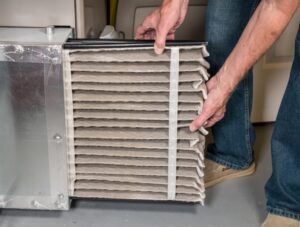In the realm of HVAC repair in Oviedo, FL, few tasks are as simple yet so important as regular air filter replacement. Often overlooked or underestimated, changing your air filter on a consistent basis can have a large impact on the efficiency, longevity, and air quality of your heating and cooling system.
Let’s take a look at the importance of air filters, the benefits of timely replacement, how to determine the right replacement schedule, and step-by-step instructions to ensure your HVAC system performs at its best.
The Role of Air Filters
Air filters might appear to be simple components, but their role goes far beyond just trapping dust particles. These filters act as the first line of defense against airborne pollutants, allergens, and debris that would otherwise circulate throughout your home. By capturing these particles air filters not only help maintain cleaner indoor air but also prevent them from entering sensitive components of your HVAC system.
The Benefits of Regular Replacement
- Clean air filters mean cleaner air in your home. This is especially important for individuals with allergies or respiratory issues.
- A clogged air filter can restrict airflow, causing your HVAC system to work harder and consume more energy. Regular replacement allows optimal airflow which leads to increased efficiency.
- Reduced strain on your HVAC system due to proper airflow can extend its lifespan, saving you money on premature replacements.
- A clean filter helps maintain consistent temperature control and airflow, preventing hot or cold spots in your living spaces.
Determining the Right Replacement Schedule
- Different filter types have different lifespans. Basic fiberglass filters might need replacement every 1-3 months while higher efficiency filters can last up to 6 months or more.
- If you live in an area with high pollen levels or have pets your filters might need to be replaced more frequently.
- Running your HVAC system often will require more frequent filter changes.
Step-by-Step Replacement Guide
- Find the air filter compartment, usually near the return air duct or blower compartment. Refer to your system’s manual if unsure.
- Before you start, turn off your HVAC system to prevent debris from being pulled into the system.
- Slide out the old filter and carefully dispose of it.
- Note the size and type of your old filter to ensure you purchase the correct replacement.
- Slide the new filter into the compartment, following the arrows indicating the airflow direction.
- Once the new filter is securely in place, you can turn your HVAC system back on.
Regular air filter replacement is a small effort that yields big rewards in terms of improved indoor air quality, energy savings, and the longevity of your HVAC system. By following the guidelines outlined in this guide, you’ll be well-equipped to keep your home’s air clean and your HVAC system operating at its best.
Contact Gary Munson Heating & Air Conditioning today to schedule your appointment. You will be more comfortable with the best!

